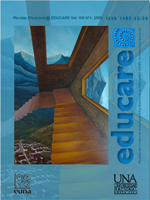De cuando Pinocho aprende valores. Una lectura de la novela de Collodi a la luz de las teorías de Shalom H. Schwartz y Leonardo Boff
DOI:
https://doi.org/10.15359/ree.13-1.1Keywords:
children’s literature, values, children’s cinematography, consumerismAbstract
Carlo Collodi published the chapters of the story Pinocchio in a children’s newspaper between 1880 and 1883. Since that time, Pinocchio has become universally known as a fundamental work in literature. Based on the perspectives of social psychologist Shalom H. Schwartaz and theologian Leonardo Boff, the author of this article contemplates the possibility that Pinocchio’s story allows the reader to develop greater social and moral values for living.
References
Bettelheim, B. (1990). Psicoanálisis de los cuentos de hadas. (10ª ed.). Barcelona, España: Crítica.
Boff, L. (2005). El Señor es mi Pastor. Consuelo divino para el desamparo humano. Cantabria,
España: SalTerrae.
Boff, L. (2007). Humanidades hoy en América Latina. Conferencia de inauguración de los cursos
de la Escuela de Estudios Generales de la Universidad de Costa Rica. San José, Costa Rica.
Cashdan, S. (2000). La bruja debe morir. De qué modo influyen los cuentos de hadas en los niños.
Madrid, España: Debate.
Collodi, C. (Ilustraciones de Sánchez, J. M.). (1983). Pinocho. San José: Editorial Costa Rica.
Collodi, C. (Selección y compilación de ilustraciones de Edens, C.). (2003). Pinocho. Barcelona,
España: Ediciones B, Grupo Z.
Collodi, C. (Ilustraciones de Innocenti, R.). (2005). Las aventuras de Pinocho. Sevilla, España:
Kalandraka.
Consejo Superior de Educación (2008). Textos para I y II Ciclos de la Educación General Básica.
San José, Costa Rica: Lehmann.
Disney, W. (Productor) & Luske, H. (Director). (1940). Pinocho. [Cinta cinematográfica]. EE. UU.:
Walt Disney Pictures.
Hazard, P. (1989). Los libros, los niños y los hombres. La Habana, Cuba: Gente Nueva.
Lionni, L. (Junio, 1985). Ante las imágenes. En Parapara, N° 11, pp. 26-33.
Lluch, G. (2004). Cómo analizamos relatos infantiles y juveniles. Bogotá, Colombia: Grupo
Editorial Norma.
Molpeceres, M., Llinares, L. y Musitu, G. (2001). Internalización de los valores sociales y estrategias
educativas familiares. En Ros, M. y Gouveia, V. (2001). Psicología social de los valores
humanos. Madrid, España: Biblioteca Nueva.
Olbius Suari, N. (Noviembre, 2003). Pinocho de Innocenti: el encanto de la pulcritud. En Cuadernos
de Literatura Infantil y Juvenil (CLIJ), Año 16, Nº 165, pp. 44-49.
Pascual, E. (Noviembre, 2003). La historia de un muñeco. En Cuadernos de Literatura Infantil y
Juvenil (CLIJ), Año 16, Nº 165, pp. 21-28.
Sachs, J. (2006). El Fin de la Pobreza. México: Debate.
Schwartz, R. (2001). ¿Existen aspectos universales en la estructura y contenido de los valores? En
Ros, M. y Gouveia, V. (2001). Psicología social de los valores humanos. Madrid, España:
Biblioteca Nueva.
Soriano, M. (1995). La literatura para niños y jóvenes. Guía de exploración de sus grandes temas.
Buenos Aires, Argentina: Ediciones Colihue.
Downloads
Published
How to Cite
Issue
Section
License
1. In case the submitted paper is accepted for publication, the author(s) FREELY, COSTLESS, EXCLUSIVELY AND FOR AN INDEFINITE TERM transfer copyrights and patrimonial rights to Universidad Nacional (UNA, Costa Rica). For more details check the Originality Statement and Copyright Transfer Agreement
2. REUTILIZATION RIGHTS: UNA authorizes authors to use, for any purpose (among them selfarchiving or autoarchiving) and to publish in the Internet in any electronic site, the paper´'s final version, both approved and published (post print), as long as it is done with a non commercial purpose, does not generate derivates without previous consentment and recognizes both publisher's name and authorship.
3. The submission and possible publication of the paper in the Educare Electronic Journal is ruled by the Journal’s editorial policies, the institutional rules of Universidad Nacional and the laws of the Republic of Costa Rica. Additionally, any possible difference of opinion or future dispute shall be settled in accordance with the mechanisms of Alternative Dispute Resolution and the Costa Rican Jurisdiction.
4. In all cases, it is understood that the opinions issued are those of the authors and do not necessarily reflect the position and opinion of Educare, CIDE or Universidad Nacional, Costa Rica. It is also understood that, in the exercise of academic freedom, the authors have carried out a rogorous scientific-academic process of research, reflection and argumentation thar lays within the thematic scope of interest of the Journal.
5. The papers published by Educare Electronic Journal use a Creative Commons License:















 The articles published by Educare Electronic Journal can be shared with a Creative Commons License:
The articles published by Educare Electronic Journal can be shared with a Creative Commons License: 



